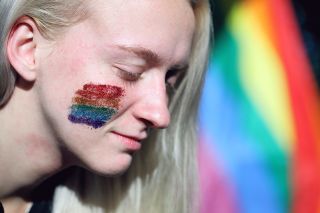SEXUAL ORIENTATION- "Heartstopper" Remains a Game Changer for LGBTQ+ Teens. The Netflix series paints an authentic picture of LGBTQ+ teens today. Reviewed by Ray Parker

KEY POINTS-
- The Netflix series "Heartstopper" reflects the diversity and social-justice awareness of Gen Z youth.
- The show goes beyond a focus on "coming out" to present a more authentic picture of modern LGBTQ+ youth.
- "Heartstopper" resonates with Gen Z for its hopeful and optimistic portrayal of queer relationships.

It may not be a surprise that today’s teens are more diverse and attuned to social justice issues than previous generations. In fact, more Gen Z youth identify as queer than ever before, according to Gallup.
In its newly-released second season, the Netflix show, Heartstopper, reflects that change, with a wide range of queer characters and storylines. The show also has an expansive view of their lives, going beyond a focus on “coming out” to reveal a more authentic picture of modern LGBTQ+ youth.
For the uninitiated, Heartstopper is a British series based on the graphic novel by Alice Oseman, who also serves as the show’s creator and lead writer. It follows two teens, Charlie and Nick (played by Joe Locke and Kit Connor, respectively), and their circle of friends as they navigate the complexities of teenage love, LGBTQ+ identities, family, relationships, and mental health. The first season ended with a centerpiece “coming out” moment as Nick finally reveals he is bisexual to his understanding mother, played by Olivia Colman.
Back when I was working as a movie executive in Hollywood, that “coming out” moment would likely have been the culmination of the story. Gay teens coming out have been dramatic fodder for decades, from Matt Carter (William McNamara) in Doing Time on Maple Drive to Billy Douglas (Ryan Phillippe) in One Life to Live and Ricky Vasquez (Wilson Cruz) in My So-Called Life.
Coming out has also unfortunately often served as characters’ swan songs, with them leaving their series shortly thereafter (as in One Life to Live) or the series coming to an end (as in My So-Called Life). When Ellen DeGeneres’ character came out in her eponymous sitcom's "The Puppy Episode," it effectively served as the series’ culmination; it was canceled a year later.
But Heartstopper carries on the more recent tradition of groundbreaking teen shows like Glee and Degrassi: The Next Generation, in which coming out is not the end of the story, but the start of something new. This season revels in the complexity and messiness that comes after coming out—shining a light on the journey of self-discovery, emotional growth, confusion, and joy that comes with living your true self. Charlie nails it when he texts Nick, “Why is being out so complicated?”
Accordingly, the show resonates with Gen Z for many reasons. First, it reflects young people’s growing preference for “inviting in” rather than “coming out,” which rightfully reframes the sharing of one’s sexuality as a privilege given to a trusted few, not a duty owed to all.
Second, it does something else vital. Oseman tells her story with a hopefulness and optimism rare in queer stories on television. The lovely, simple animations weaved throughout the show help craft a playful tone. And it’s a show parents can watch with their kids (as I have), where you know that everything’s going to be OK in the end. That’s important—perhaps even life-saving—in a record year for anti-LGBTQ+ legislation in the U.S., according to the Human Rights Campaign.
Most people don’t get to talk with young people all day about what they watch like I do. But I’ve had a front-row seat to the Heartstopper phenomenon over the last year, and our own research bears out that it’s a game changer. Through our Youth Media Representation Program, we engage young people each year to conduct their own research studies. This year, one group of teens chose LGBTQ+ representation in entertainment as their topic and they found that teens overwhelmingly singled out Heartstopper for having “very good” representation, far more than other LGBTQ+ movies and shows, including Call Me By Your Name and Love, Simon.
With LGBTQ+ representation in media decreasing and a crisis in youth mental health, we need more shows like Heartstopper that authentically reflect the reality of Gen Z, and give young people cause for hope.
- Questions and Answers
- Opinion
- Motivational and Inspiring Story
- Technology
- True & Inspiring Quotes
- Live and Let live
- Focus
- Art
- Causes
- Crafts
- Dance
- Drinks
- Film/Movie
- Fitness
- Food
- Игры
- Gardening
- Health
- Главная
- Literature
- Music
- Networking
- Другое
- Party
- Religion
- Shopping
- Sports
- Theater
- Wellness
- News
- Culture

